Meta Description
AI health agents are transforming how we visit doctors—delivering faster triage, personalized care, and smarter remote checkups for modern patients.
The Waiting Room Is Going Digital
For years, doctor visits have meant long waits, rushed conversations, and unclear follow-ups. But AI agents are starting to flip that experience. These intelligent systems use natural language processing (NLP), patient data, and predictive models to screen symptoms, suggest care paths, and schedule appointments—all before you even step into a clinic.
Case Study: Mount Sinai’s AI Triage Assistant
Before: Patients waited up to 45 minutes just for a nurse to assess urgency.
Solution: Mount Sinai launched an AI-powered web triage bot using past medical histories and decision trees.
Result: ER wait times dropped 18%, and patient satisfaction rose 12% within three months [1].
Practical Insights
- Try symptom checkers from your provider before booking a visit
- Share accurate medical history with your AI assistant for better routing
- Look for clinics that offer AI-based pre-visit screening to save time
AI agents in healthcare are not replacing doctors—but they are making access to care faster, smarter, and more tailored to each person’s needs.
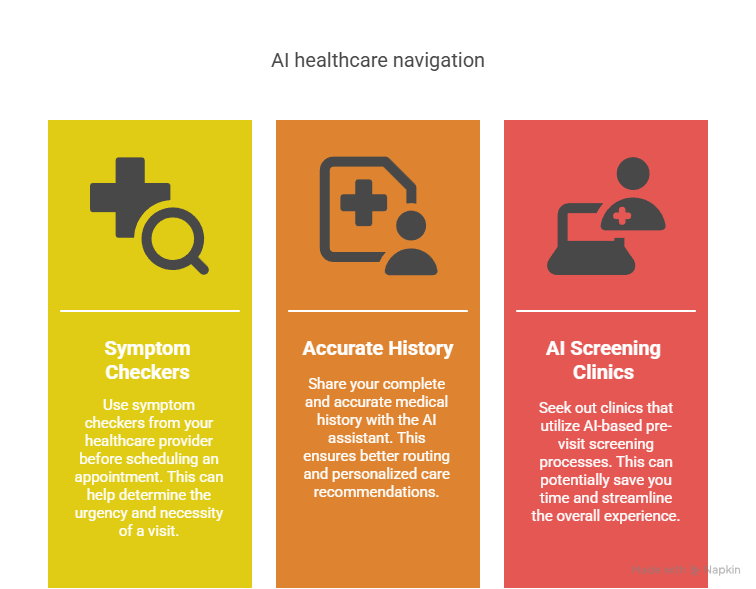
The Virtual Nurse Who Never Sleeps
For chronic illness patients and busy caregivers, 24/7 access to medical support can be life-changing. AI agents now power virtual nurses that monitor vitals, manage medication schedules, and answer questions through text or voice.
Case Study: Ada Health for Diabetes Support
Before: Type 2 diabetes patients struggled with tracking blood sugar and dosing reminders.
Solution: Ada’s AI agent tracks daily readings, suggests food adjustments, and flags anomalies.
Result: 21% increase in medication adherence and fewer emergency visits per patient [2].
Practical Insights
- Use AI health apps to log symptoms or ask about side effects
- Combine wearables (e.g., smartwatches) with agent-powered dashboards
- Choose platforms that allow clinician review for anything AI flags
These agents work like friendly companions, giving peace of mind when doctors aren’t available.
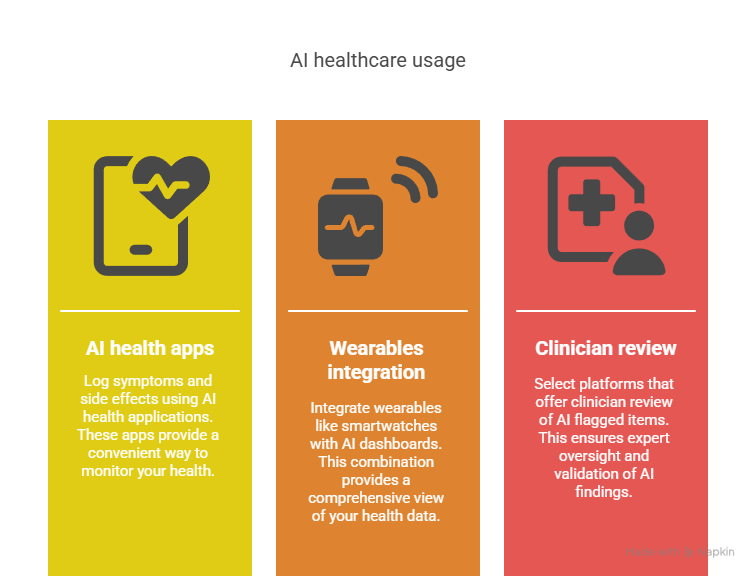
Personalized Treatment Before You Walk In
The most frustrating part of healthcare for many? Repeating information over and over again. AI health agents are solving that by integrating with electronic health records (EHR) to automatically recall your history and tailor care suggestions based on your profile.
Case Study: One Medical’s Smart Intake
Before: New patients filled out 8+ pages of paper forms.
Solution: AI intake agents pre-fill forms using previous visits, demographics, and symptoms.
Result: Time to care shortened by 20 minutes per appointment [3].
Practical Insights
- Opt in to EHR-connected AI services to reduce paperwork
- Review data access settings to control what’s shared
- Look for providers that offer AI-assisted follow-ups after visits
This allows clinicians to focus on what matters most—**diagnosis and connection—**rather than admin work.
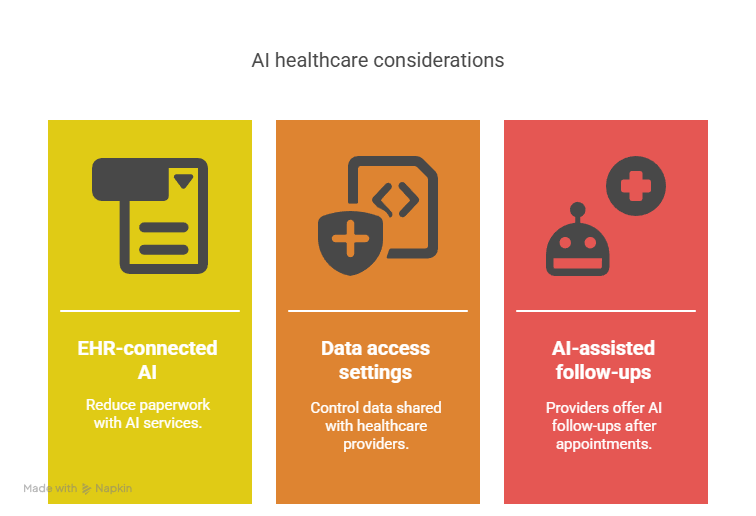
When Home Becomes the New Clinic
AI agents are making remote care truly smart. Through mobile apps, smart speakers, and wearables, agents collect patient data and send alerts, reminders, or even auto-schedule follow-ups when needed. It’s a core part of what many call next-gen health.
Case Study: Babylon Health’s Virtual Monitoring
Before: Patients didn’t know if symptoms were urgent or not.
Solution: Babylon used an AI agent to combine daily logs, device data, and patient questionnaires.
Result: Unnecessary clinic visits dropped 27% and patient trust increased [4].
Practical Insights
- Link AI agents to your smartwatch or health tracking app
- Set thresholds: e.g., “alert me if heart rate stays above 100 for 10 min”
- Enable voice-activated check-ins with Alexa or Google Assistant
This shift gives people more control and confidence in managing their own health from home.
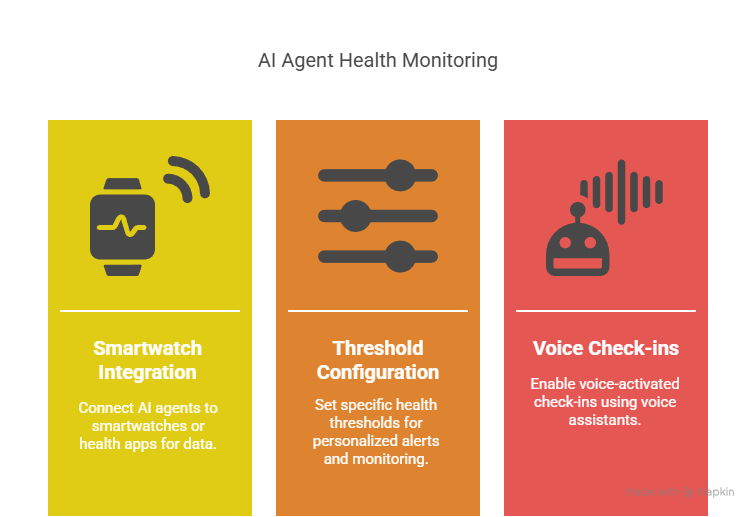
Real Problems AI Agents Are Solving—For Everyone
AI health agents aren’t just trendy tech—they’re fixing problems that both providers and patients have struggled with for years. Here are three core pain points now being addressed:
1. Too Much Admin, Too Little Time
- For Providers: Doctors and staff spend up to 40% of their time on admin tasks—from charting to billing.
→ AI agents automate form-filling, appointment reminders, and claim processing, freeing up more time for actual care. - For Patients: Endless forms and repeated questions are frustrating, especially during illness.
→ Smart intake agents auto-fill patient info and reduce paperwork before you even arrive.
2. Delayed Responses = Missed Care
- For Providers: Nurses can’t always respond instantly to every patient inquiry.
→ AI agents act as 24/7 triage assistants, flagging serious cases and deflecting minor ones. - For Patients: Long wait times for answers or appointments cause stress—or worse, skipped visits.
→ AI agents give instant symptom feedback, schedule slots, or route you to virtual care options.
3. Inconsistent Follow-Up and Monitoring
- For Providers: Tracking patient recovery post-visit is hard at scale.
→ AI agents monitor vitals or check in via chat, sending alerts only when intervention is needed. - For Patients: Many people forget meds or don’t know when to return.
→ Agents send friendly nudges, refill reminders, and offer personalized health tips right to your phone.
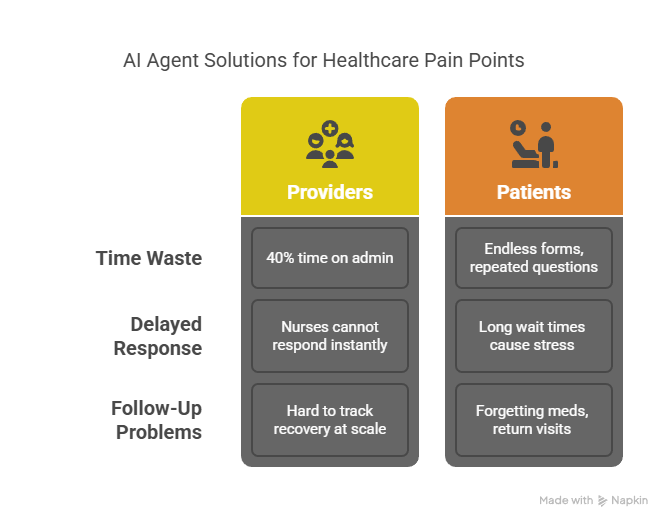
💡 Why It Matters
These changes go beyond convenience. By reducing friction on both sides, AI agents help make healthcare more human—with more time to listen, less time to type.
Conclusion
AI health agents are not just digital tools—they’re becoming active partners in how we manage wellness. Whether screening symptoms, organizing records, or monitoring chronic conditions, they’re redefining what a “doctor visit” even means.
If you’re a patient looking for more convenience, or a caregiver wanting peace of mind, it’s worth exploring what AI-powered services your provider offers. The future of healthcare isn’t only in the hospital—it’s already on your phone.
References
- “AI in Emergency Triage,” Mount Sinai Health System, Apr 2024. https://www.mountsinai.org/news/ai-triage
- “Digital Diabetes Monitoring Boosts Adherence,” Ada Health Research, Feb 2024. https://ada.com/news/ai-diabetes
- “One Medical Improves Check-In with AI,” HealthTech Review, Jan 2024. https://healthtechreview.com/onemedical-intake
- “Babylon’s Virtual Care Results,” Babylon Health, Mar 2024. https://www.babylonhealth.com/blog/results-ai-agent
Tags: AI agents, next-gen health, virtual care, smart triage, AI nurses, digital health tools, remote monitoring, personalized healthcare
